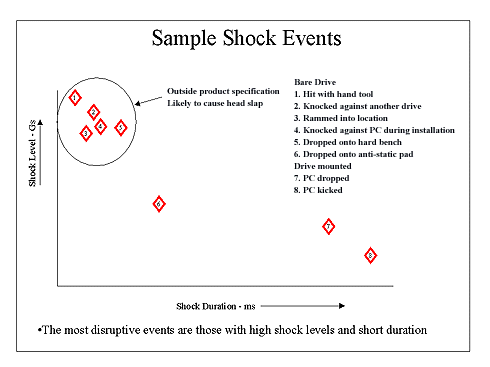[ The PC Guide | Systems and Components Reference Guide | Hard Disk Drives | Hard Disk Performance, Quality and Reliability | Hard Disk Quality and Reliability ]
Hard Disk Quality and Reliability Features
Hard disk manufacturers recognize the great importance of their customers' data, and therefore, the importance of the quality and reliability of their hard disk drives. In addition to generally improving the quality of their processes and their products, most manufacturers have added special features to their hard disks to help enhance their reliability. Most of these efforts are predicated on the principle that "an ounce of prevention equals a pound of cure". They are intended to either reduce the chances of a problem occurring, or at least let the user know if a problem is likely to occur, before data loss happens.
|
This chart shows several sample shock events that can
affect hard disks, |
Image � Quantum
Corporation |
In this section I describe in detail the more common features being implemented on today's drives to enhance their quality and reliability, and to provide warning to the user if a hardware failure is imminent.
![]() Next: Self-Monitoring Analysis and Reporting Technology (SMART)
Next: Self-Monitoring Analysis and Reporting Technology (SMART)
| The PC Guide
(http://www.PCGuide.com) Site Version: 2.2.0 - Version Date: April 17, 2001 © Copyright 1997-2004 Charles M. Kozierok. All Rights Reserved. |
Not responsible for any loss resulting from the use of this site. Please read the Site Guide before using this material. |
